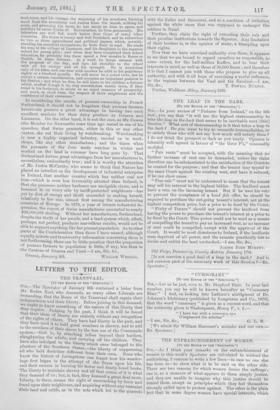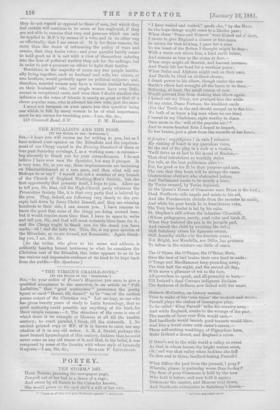THE ENFRANCHISEMENT OP WOMEN.
[To THE EDITOR OF THE n SPROTATOR.1 SIR,—As I think your remarks on the enfranchisement of women in this week's Spectator are calculated to mislead the unthinking, I venture to write a few lines—in case no one else has done so—to show what is to be said on the other side. There are two reasons for which women desire the suffrage ; one is, as a measure of what appears to them simple justice, and they are unable to imagine why this justice should be denied them, except ou principles which they feel themselves strongly called upon to protest against. The other is the plain fact that in some degree women have special interests, which
they do not regard as opposed to those of men, but which they feel certain will continue to be more or less neglected, if they are not able to exercise that very real pressure which can only be applied to M.P.'s by means of a vote, and in uo other way so effectually, that I am aware of. It is for these reasons, far more than the desire of influencing the policy of wars and armies, that they desire votes ; and your parallel hardly seems to hold good, as it is not with a view of themselves entering into the lists of political warfare they ask for the suffrage, but in order to put a pressure on others to fight their battles.
Doubtless, in the majority of cases, any two people habitu- ally living together, such as husband and wife, two sisters, or two brothers, would probably agree on political subjects ; and, therefore, married women may have a certain limited influence on their husbands' vote, but single women have very little, except in exceptional eases, and even then I doubt whether the influence on the votes of friends is nearly as great as that of a clover popular man, who is allowed his own vote, just the same.
I must not trespass on your space, but this question being one which is felt by many women to be of vital importance, must be my excuse for troubling you.— I am, Sir, &c.,



































 Previous page
Previous page